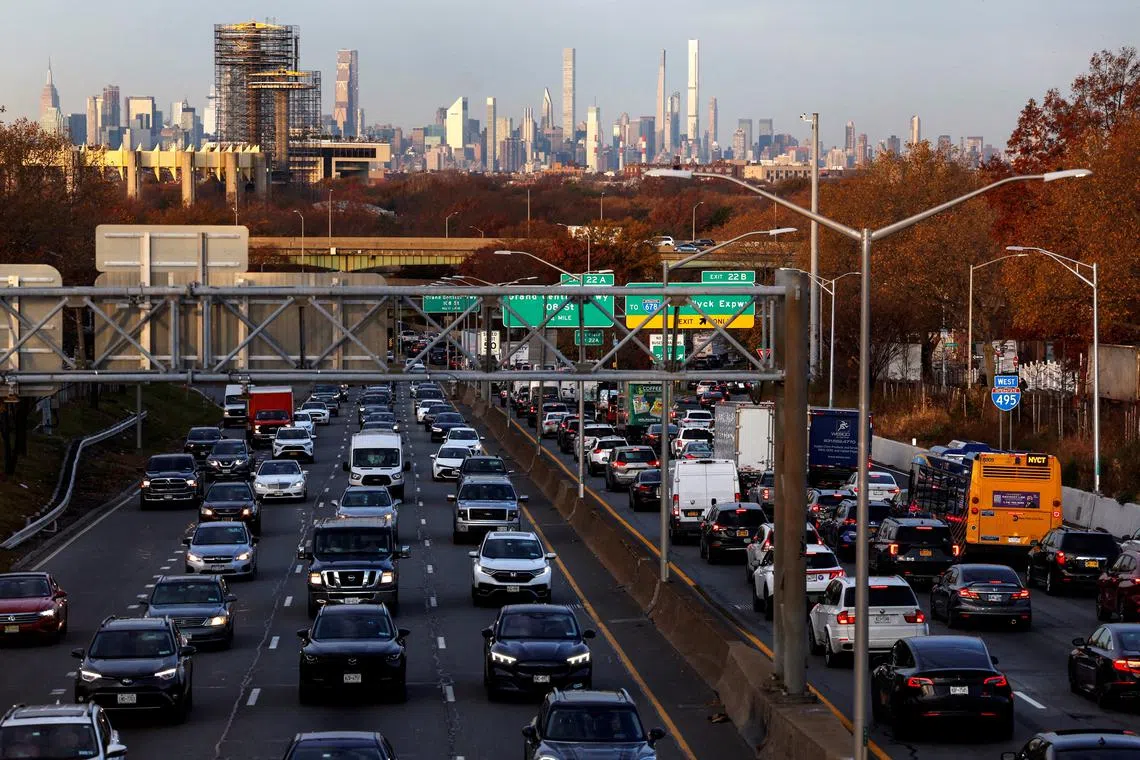New York judge temporarily blocks White House from ending congestion pricing
Sign up now: Get ST's newsletters delivered to your inbox

The toll, which started Jan 5, charges most drivers US$9 (S$11.60) during peak traffic hours, with the goal of reducing gridlock and funding long overdue transit improvements.
PHOTO: REUTERS
Stefanos Chen, Winnie Hu and Wesley Parnell
Follow topic:
NEW YORK – A federal court judge on May 27 temporarily blocked the Trump administration’s efforts to force New York to end congestion pricing, ensuring the tolling programme would remain in place until at least early June.
The move effectively keeps congestion pricing, which charges motorists to enter Manhattan south of 60th Street, running through at least June 9 by preventing the Trump administration from withholding funding for New York transportation projects if the programme is not halted. US President Donald Trump has vowed to kill the toll.
The decision grants a key reprieve to the programme, the first of its kind in the US, since Washington ordered New York to shut it down more than three months ago. The toll, which started Jan 5, charges most drivers US$9 (S$11.60) during peak traffic hours, with the goal of reducing gridlock and funding long overdue transit improvements.
Judge Lewis Liman granted the Metropolitan Transportation Authority’s request for a temporary restraining order against the Trump administration after oral arguments from both sides in federal court in Lower Manhattan. The authority, which runs New York City’s mass transit system, operates the toll programme.
Judge Liman said that New York state “would suffer irreparable harm” without a restraining order. He also left open the possibility of issuing a longer-term protective order. Judge Liman noted that the MTA “showed a likelihood of success” in its case to maintain congestion pricing.
Mr Charles Roberts, a lawyer for the Department of Transportation, said the federal government would comply with the judge’s order. A spokesperson for the agency added that “the judge’s ruling today was not on the merits of our case against Hochul’s class warfare, but rather a temporary pause to have more time to reach a decision”.
In a February letter, Transportation Secretary Sean Duffy said he was revoking federal approval of the toll, because it exceeded the scope of the programme that authorised it. He said it was an unfair cost to drivers, and that the toll should not primarily fund mass transit projects instead of roads.
The MTA quickly sued to block Mr Duffy’s intervention, arguing the programme had been thoroughly reviewed, including by federal agencies, and was working. Since the toll started, traffic is down, speeds are up and the authority is on track to use the toll revenue to finance US$15 billion in critical upgrades.
Despite both sides agreeing to let the case play out in court, Mr Duffy said in April that his agency would begin withholding federal approvals and funding for a range of transportation projects beginning May 28.
Mr Janno Lieber, the MTA’s chief executive, said he welcomed the judge’s decision.
“I think the message is he wants no more coercive threats and threats of punishment if we don’t do what they say,” he said.
In a statement, Governor Kathy Hochul of New York said the decision was “a massive victory for New York commuters” and reaffirmed that the state would keep the programme running.
Ms Roberta Kaplan, a lawyer representing the MTA, said the federal government’s efforts to end congestion pricing, even after New York had gained approval, could lead to an “eternal fog of uncertainty” for federally approved programmes.
Mr Kevin Willens, the MTA’s chief financial officer, argued in a letter to the court that Washington’s threats had put the authority in an impossible situation.
The MTA could either turn off the toll, jeopardising the US$15 billion the programme is expected to raise, or it could defy Mr Duffy’s demands, and face the prospect of losing billions in funding for New York state highway and transit projects.
Professor Michael Pollack from the Benjamin N. Cardozo School of Law, who supports congestion pricing, said that, in most cases, a temporary restraining order cannot be appealed. Though a final judgment still has to be reached in the case, he said, Judge Liman’s comments and decision “certainly bode well for the MTA going forward”.
Congestion pricing still faces several legal challenges. Mr Jack L. Lester, a lawyer representing New Yorkers Against Congestion Pricing Tax, said the group would fight the programme in state court, adding that the federal government’s objections helped their case.
But some congestion pricing supporters were hopeful that Judge Liman’s decision could signal that the toll programme, which had been under attack since its introduction, would soon overcome one of its most formidable challenges.
“It looks like the beginning of the end of the administration’s efforts to derail this landmark transportation programme,” said Mr Eric A. Goldstein, a senior attorney for the Natural Resources Defence Council, who attended the court hearing.
Judge Liman has already rejected a number of other arguments against congestion pricing, in four related cases brought by opponents. NYTIMES

